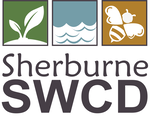Irrigation Scheduling
Irrigation scheduling is the process used by irrigation system managers to determine the correct frequency and duration of watering.
|
Irrigation Scheduling Quick Facts...
Uniform water distribution across the field is important to achieve the maximum benefits from irrigation scheduling/management. Accurate water application prevents over or under irrigation. Over irrigation wastes water, energy and labor; leaches expensive nutrients below the root zone, out of reach of plants; and reduces soil aeration, and thus crop yields. Under irrigation stresses the plant and causes yield reduction. Irrigation scheduling offers several advantages:
If you would like to be added to this list, please provide your contact information in the form below, or contact our office at 763-241-1170 x 4.
|
|
|

